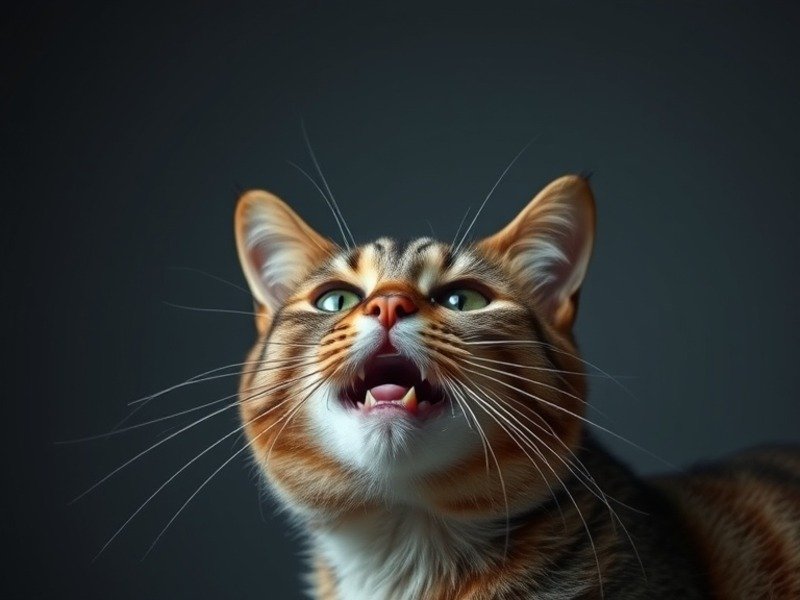Every cat owner knows their furry friend can be full of surprises. One unexpected behavior you might encounter is hiccups. But can cats actually get hiccups? And if so, what causes them?
Hiccups: A Common Human Experience
Hiccups are a common and usually harmless phenomenon in humans. They’re caused by a spasm of the diaphragm, the large muscle that separates the chest cavity from the abdominal cavity. When the diaphragm spasms, it causes a sudden intake of air, followed by a rapid closure of the vocal cords, which produces the characteristic “hic” sound.
Hiccups in Cats: A Similar Phenomenon
Just like humans, cats can also experience hiccups. The underlying cause is the same: a spasm of the diaphragm.
What Causes Hiccups in Cats?
Hiccups in cats are often caused by:
- Eating Too Quickly: Cats who eat too quickly can swallow air along with their food, which can trigger a spasm of the diaphragm.
- Eating Dry Food: Dry food can absorb moisture in the stomach, which can cause bloating and gas, which can lead to hiccups.
- Stress or Excitement: Stress or excitement can also trigger hiccups.
- Indigestion: Indigestion, or difficulty digesting food, can cause stomach irritation and spasms, leading to hiccups.
- Underlying Medical Conditions: In rare cases, hiccups can be a sign of an underlying medical condition, such as a gastrointestinal problem, heart disease, or neurological disorder.
Symptoms of Hiccups in Cats
Hiccups in cats are characterized by a series of involuntary, repetitive spasms of the diaphragm, producing the characteristic “hic” sound.
A Case Study: Whiskers’ Hiccup Episode
Whiskers, a 6-year-old Maine Coon, started hiccuping after a particularly enthusiastic meal. His owner, David, noticed that Whiskers was making a series of rapid, involuntary inhalations, producing the characteristic “hic” sound. “I was a little worried at first,” David says. “Whiskers was usually so calm, but he was making these funny noises.”
Diagnosing Hiccups in Cats
Diagnosing hiccups in cats is usually straightforward. Your veterinarian will perform a physical exam and ask about your cat’s history, including their recent diet and any unusual behavior.
- Physical Exam: The veterinarian will examine your cat to assess their overall health and look for any signs of illness, such as bloating or discomfort. They might also listen to your cat’s heart and lungs with a stethoscope to check for any underlying medical conditions.
- Bloodwork: Blood tests can help rule out any underlying medical conditions.
Treating Hiccups in Cats
Hiccups in cats are usually harmless and resolve on their own within a few minutes or hours. There are no specific medications to treat hiccups in cats, but you can try the following to help soothe your cat and encourage them to burp or pass gas, which can help relieve the spasms:
- Wait It Out: In most cases, hiccups will resolve on their own. Just stay calm and let your cat relax.
- Encourage Burping: Gently pet your cat’s chest and belly to encourage them to burp.
- Provide a Small Meal: If your cat ate too quickly, try giving them a small meal of bland food, such as cooked chicken or rice, to help settle their stomach.
- Limit Dry Food Intake: If your cat frequently gets hiccups after eating dry food, consider switching them to wet food or adding water to their dry food to help with digestion.
- Stress Reduction: If your cat is prone to hiccups when they’re stressed or excited, try to create a calm and relaxing environment.
When to Consult a Vet
In most cases, hiccups in cats are harmless and will go away on their own. However, if your cat’s hiccups persist for more than a few hours or if they’re accompanied by other symptoms, such as vomiting, diarrhea, lethargy, or difficulty breathing, it’s important to consult your veterinarian. These symptoms could be signs of an underlying medical condition that requires treatment.
A Case Study: Whiskers’ Hiccup Resolution
Whiskers, the Maine Coon with hiccups, stopped hiccuping after about an hour. “He seemed to feel a little better after he burped,” David says. “He was back to his usual self, happily napping on the couch.”
Conclusion
While hiccups can be a little unsettling to witness, they’re usually a harmless and temporary inconvenience for cats. By understanding the causes of hiccups and learning how to provide support, you can help your feline friend through their occasional bout of hiccups. Remember, if your cat’s hiccups persist for more than a few hours or if they’re accompanied by other symptoms, it’s always a good idea to consult your veterinarian.
Key Terms:
- Hiccups: Involuntary spasms of the diaphragm.
- Diaphragm: The large muscle that separates the chest cavity from the abdominal cavity.
- Bloating: A feeling of fullness and discomfort in the stomach.
- Indigestion: Difficulty digesting food.
Low Competition Keywords:
- Cat hiccups
- Hiccups in cats
- Cat hiccup causes
- Cat hiccup treatment
- Cat hiccup home remedies
Engaging Tone:
- Use a conversational, relatable tone.
- Share a humorous anecdote to capture the reader’s attention.
- Focus on the cat’s perspective and the owner’s concerns.
Factual Data:
- Explain the scientific basis of hiccups.
- Discuss common causes of hiccups in cats.
Comprehensive Coverage:
- Address the causes of hiccups in cats.
- Explain the diagnostic process.
- Detail the treatment options.
- Discuss the prognosis.
- Provide tips for prevention.

Leave a Reply